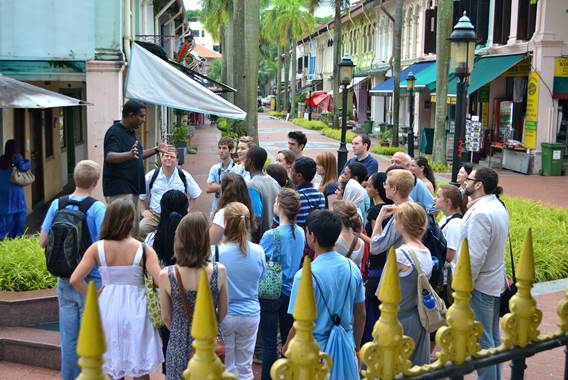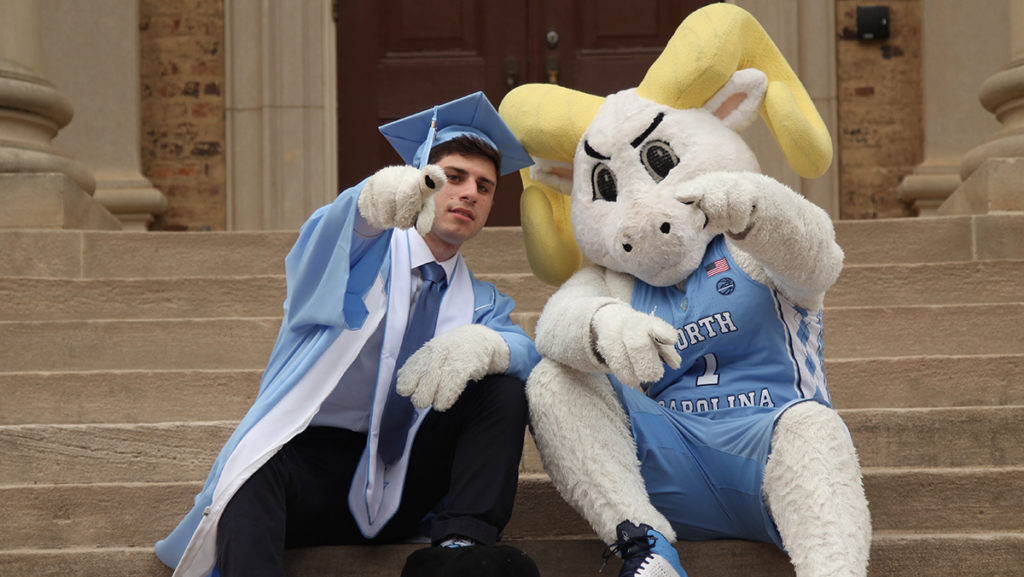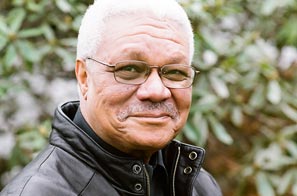An assistant county manager in Cumberland County whose efforts to stem the local opioid crisis had stalled. An out-of-state student who needed an affordable ride home for fall break. The mayor of a coastal town threatened by climate change and rising sea levels.
They all came to Carolina’s 226th birthday celebration to talk about the life-changing help provided by the University’s people and the programs they run.
“While we are formally known as the University of North Carolina, we might better be known as the University for North Carolina,” said Interim Chancellor Kevin M. Guskiewicz at the Oct. 12 University Day ceremony in Memorial Hall.
“We want our state to be a place where small towns and cities live side by side, working together and benefiting one another. We want the people of our state to live healthy, productive, secure lives. We want to prepare the next generation of leaders to build our state and ensure its continued growth.”
The pairing of three faculty speakers with people helped by Carolina underscored the University Day theme of “service to the state.”
Rick Luettich, marine sciences professor and director of the Institute of Marine Sciences, and his guest, Mayor Everette “Rett” Newton of Beaufort, spoke about how Carolina researchers have been working with that town to resolve water quality issues. Local officials also used Luettich’s storm surge models in real time during both Hurricanes Florence and Dorian to help with evacuations and search, rescue and recovery efforts.
Bernard Bell, executive director of the Shuford Program in Entrepreneurship in the economics department, introduced Nehemiah Stewart, a junior chemistry and math double major from Southeast Washington, D.C. When looking for a ride home to see friends and family and feast on his grandma’s cooking, Stewart came up with the idea of an Uber- or Lyft-style service matching drivers with riders. The Tar Heel twist that makes users feel safer is that all users must have a unc.edu email address. He pitched the Vector Rideshare app to Bell and, with the Shuford Program’s help, launched his service, which he hopes to expand to other universities in North Carolina and beyond.
Anita Brown-Graham, School of Government professor and director of ncIMPACT, invited Duane Holder to talk about how ncIMPACT’s experts and research helped Cumberland County secure a $900,000 federal grant to implement a three-year comprehensive opioid abuse program. The county will have a full-time health department position dedicated to the opioid project, overdose and fatality review teams, enhanced pre-arrest programs and an expanded community education and marketing campaign.
Distinguished presentations
As it traditionally does on its birthday, the University also presented Distinguished Alumna and Alumnus Awards, which honor alumni who made an outstanding contribution to humanity. This year’s recipients were James E. Delany, commissioner of the Big 10 Conference; Nikole Hannah-Jones, award-winning investigative reporter covering racial injustice for The New York Times Magazine; Jill C. McCorkle, novelist and short-story writer; and Robert D. Newman, president and director, National Humanities Center.
Giselle Corbie-Smith, Kenan Distinguished Professor of Social Medicine, director of the Center for Health Equity Research and professor of internal medicine in the School of Medicine, received the faculty service award named for Edward Kidder Graham, early 20th-century president of the University.
In 1914, Graham famously expressed the University’s service goal: “We hope to make the campus co-extensive with the boundaries of the state.”
In 2019, Board of Trustees Chair Richard Stevens expanded that mission. “Today, we should say not just co-extensive with the boundaries of our state, but also with the boundaries of our world,’ Stevens said in his University Day remarks. “Our campus goes well beyond Chapel Hill, not only to every county in North Carolina, but to every corner of the world.”
Tribute to hometown
Just as Carolina celebrated its milestone 225th birthday all last year, this year the town of Chapel Hill is marking its 200th year of governance with several programs and events. On University Day, Guskiewicz recognized Mayor Pam Hemminger, who brought greetings from the town of Chapel Hill, and recognized the University’s special relationship with the town.
“Few universities are blessed with such a strong town partnership as we are,” Guskiewicz said. “We must always be an asset to our town, and I am grateful to Mayor Pam Hemminger and the entire town government for their leadership.”
A new background on the Memorial Hall stage projected the strength of that bond by including a Franklin Street sign with the silhouettes of campus landmarks like the Old Well and the Bell Tower. But as the day’s speakers pointed out, the University’s mission is to serve far beyond its low stone walls and neighboring Franklin Street.
“As we move forward together, we are re-committing ourselves to Edward Kidder Graham’s mission of service to our state and strengthening our partnerships with all North Carolinians,” Guskiewicz said in his closing remarks.
The chancellor ended the ceremony with a commitment to “spend the next year listening to our partners across the state,” starting with the Tar Heel Bus Tour over fall break. On the tour, 90 faculty and campus leaders will travel on three different buses to the southern, southeastern and western regions of the state.
“I charge you to listen to the people of our state and engage with the towns and communities our students call home,” he told bus tour participants in the audience. “I hope this tour will promote scholarship and service that responds to the concerns of the state and contributes to the common good. And I charge you to find ways to center our work around the needs of North Carolinians and live our mission, our ‘one reason’ as a public university.”
Story by Susan Hudson, The Well. Video by Aaron Moger, University Communications




